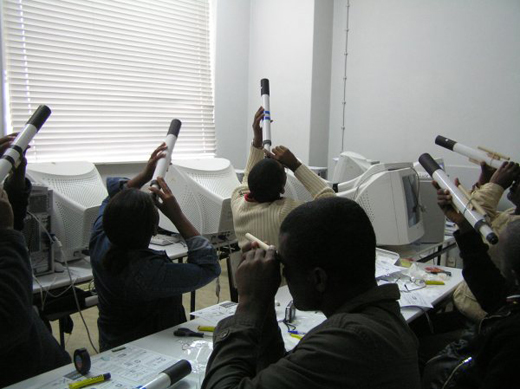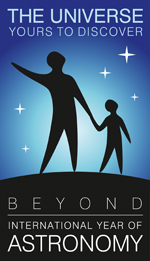1st GTTP for Portuguese Speaking African Countries
12 April 2010

The Galileo Teacher Training Program (GTTP) team in Portugal, still in the scope of IYA2009 national plan of activities and with the support of Fundação Calouste Gulbenkian has promoted the first GTTP training session for Portuguese speaking African countries (PALOP is the acronym in Portuguese). The session had six participants from: Angola, Cape Verde, Mozambique and São Tomé and Prince. The Portuguese team was composed by astrophysicists and Galileo Teachers (GT). During one week the group had the opportunity to be exposed to several different types of tools and resources starting from the very simple ones, with very simple material ending with a robotic telescope observing session.
The session had several different ingredients. The mornings started with a Basic Introduction to Astronomy. During the afternoons they learned to build spectroscopes, Galileoscopes and other non-technological hands-on activities, a selected sample from the Portuguese GHOU team materials, UNAWE, etc. An introduction to telescopes and observing sessions took place (solar and night sky).
They also learned to use astronomical software like Stellarium and Celestia, they were introduced to the International Asteroid Search Campaign, had a brief introduction to Google Earth, presented by one of the participants from Angola, Gilberto Machado.
The week ended with an introduction to Salsa J, the GHOU (Global Hands-on Universe) image processing software, were they learned to create their own astronomical colour images and finalised the training by observing using robotic telescopes.
Besides the opportunity to be exposed to new methods for science teaching the participants had the opportunity to share with the Galileo Teachers (GT) their ideas and experiences. Maria José Calado, one of the GT used the opportunity to share with everyone her concerns. She works with a very complicated group of kids, many of them coming from the participants' countries, unprepared and not motivated to study. A strategy to reach these students was outlined and several interviews with the participants were made in order to try to make her kids realise the once in a lifetime opportunity they are wasting. One of the participants from Angola, Efraim Soma, shared, in a recorded video, his struggle in order to be educated. The same education Maria José kids are throwing away for not being interested or perhaps for not having the needed awareness of the privilege they have. A programme devoted to foster communication between kids from the two continents will follow.
The participant nations showed different types of needs. Efraim and Nadia Bruno (Mozambique) manifested the need to have materials to be handed to teachers they are going to train. Materials such as astronomy books, posters, etc. The Portuguese team, Efraim and Nadia will collaborate to obtain and develop such materials and try to find the needed sponsorship to produce and send it were it can make the difference. This is a big challenge ahead of us, one worth fighting for. Nadia shared with us stories of kids having classes under trees, their regular classroom, not bad if you like fresh air, but try this during rainy days or with cold weather.
In Cape Verde there are no astronomers, so Adilson Semedo is engaged in reversing this situation. He trusts GTTP will be an important ally in starting building the community by preparing teachers and motivating students to start pursuing this path. The same view is shared by Manuel Penhor, the participant from São Tomé, he trusts that with its multiplier effect GTTP can help create the needed skills in teachers and foster the desired inspiration in students to take careers in science. There was an important presence in the media were the participants had the opportunity to be interviewed by the Portuguese news agency “Agência Lusa”. They hope this good visibility to their visit to Portugal will help them start or continue conversations with their local authorities.
Another important outcome of this meeting, in the words of Claudio Moisés, another participant from Mozambique, was the possibility of meeting other nations' representatives face to face. They decided not to let go this moment and to work quickly and steadily to create an association to strongly represent the PALOP in the world of astronomy. All PALOP lack an astronomy community and they see in Astronomy Education a clear path to engage new generations in pursuing this path and hope to work with their local authorities in order to create the needed conditions to foster the birth of a strong community. They all see GTTP and the Portuguese team as strong allies in this journey. They left Portugal with a promise of continuing the effort in their nations and left behind a legion of future supporters of their quest.
Search IYA2009 Updates

National Nodes: 148
Organisational Nodes: 40
Organisational Associates:33
National Websites: 111
Cornerstone Projects: 12
Special Task Groups: 11
Special Projects:16
Official Products:8
Media Partners:22


